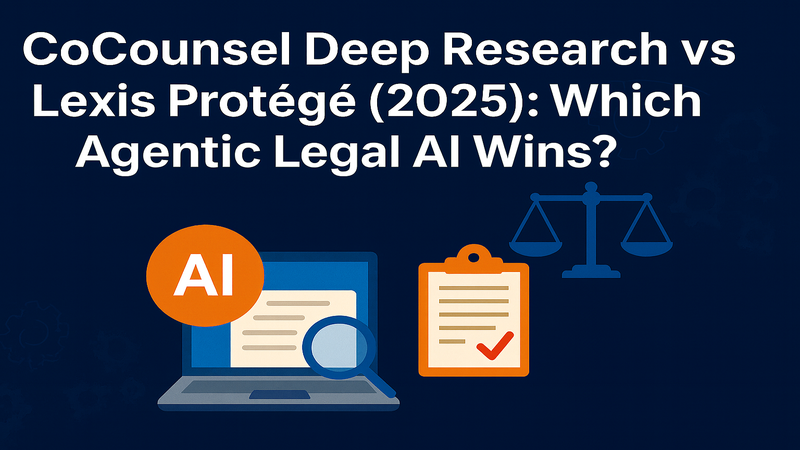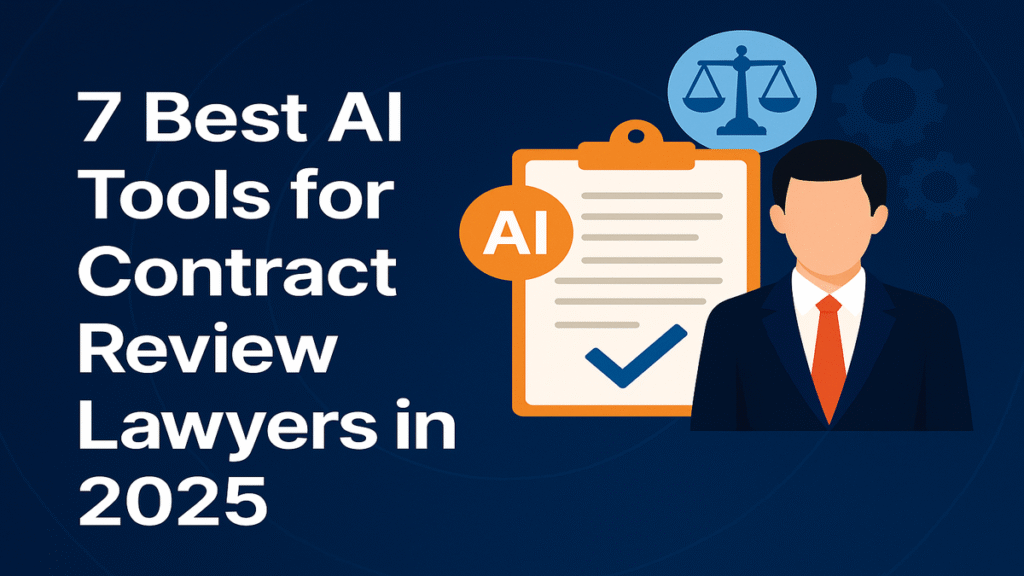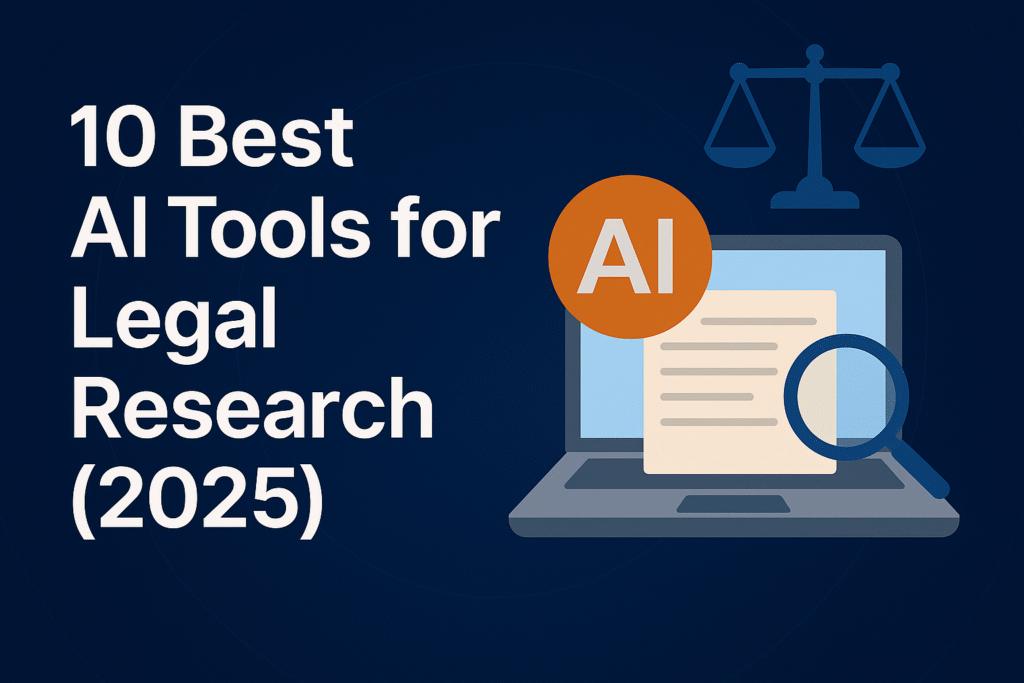TL;DR: August 2025 brought two big moves in agentic legal AI. CoCounsel Deep Research (Thomson Reuters) executes multi-step legal research plans grounded in Westlaw/Practical Law and TR tools like KeyCite/Precision Research. Lexis Protégé adds a “General AI” mode with a toggle to move between authoritative legal AI and general-purpose models inside a single secure workspace. Pick TR if your priority is deeply grounded, explainable legal research; pick Lexis if you want flexible model choice plus integrated legal content in one pane of glass.
Updated: August 2025
Introduction
“Agentic” AI doesn’t just answer—it plans a workflow, executes steps, and returns a structured result. In legal, that means delegating a complex research assignment to an AI that explains its method, cites authority, and produces a work product you can review. That’s exactly what CoCounsel Deep Research and Lexis Protégé are designed to do, and both were advanced this month with new capabilities aimed at firm-wide adoption.
What is CoCounsel Deep Research?
CoCounsel Legal (Thomson Reuters) now ships Deep Research, described as a professional-grade agentic AI that reasons through questions, generates a multi-step research plan, and returns a comprehensive memo grounded in Westlaw and Practical Law. It also connects to TR research tools such as KeyCite and Precision Research. Deep Research is being delivered across CoCounsel Legal and Westlaw.
Why it matters: Instead of running queries and stitching results, Deep Research aims to explain its logic and produce a structured output you can audit—helpful for complex, multi-jurisdiction issues and partners who want a transparent trail.
What is Lexis Protégé (and Protégé General AI)?
Lexis Protégé is a personalized AI assistant integrated across the LexisNexis ecosystem (Lexis+ AI, content, and apps). In August 2025, Lexis announced Protégé General AI: within one secure workspace, users can toggle between authoritative legal AI (Lexis content-grounded) and general-purpose models for broader tasks—reducing context switching while preserving governance. The company also highlights the ability to select modern models when using General AI.
Why it matters: Many legal teams were hopping between consumer chatbots and legal-specific tools. Protégé’s integrated, one-pane approach aims to keep everything auditable and secure while still giving you model flexibility.
Head-to-Head: Key Differences
| Dimension | CoCounsel Deep Research (TR) | Lexis Protégé (with General AI) |
|---|---|---|
| Core idea | Agentic Deep Research executes a multi-step plan and returns a grounded memo with TR research tools (KeyCite, Precision Research). | Personalized assistant with a toggle: run authoritative legal AI or switch to General AI models in one secure workspace. |
| Grounding | Westlaw + Practical Law are first-class sources; tight links to TR research stack. | Deep integration with Lexis content; authoritative mode draws from Lexis corpus. |
| Model flexibility | Emphasis on TR-orchestrated, legal-grade reasoning tied to TR content/tools. | Choose modern general models (e.g., GPT-class, Anthropic) inside Protégé’s workspace. |
| Explainability | Produces a plan + structured report; designed to explain logic and cite authority. | Explanations + citations in legal mode; plus the option to draft/explore in General AI then verify in legal mode. |
| Best for | Deep, law-first research where Westlaw/Practical Law + KeyCite matter. | Shops that want model choice but to keep everything under Lexis governance in one pane. |
| Where it runs | CoCounsel Legal and Westlaw. | Lexis+ AI / Protégé environment. |
| Pricing note | Enterprise-style; contact TR. | Enterprise-style; contact Lexis. |
Hands-On: What the Workflows Feel Like
A. Multi-jurisdiction research (50-state survey)
-
CoCounsel Deep Research: You delegate the question; it generates a plan, runs state-by-state analysis, and returns a memo with citations and KeyCite links to verify status. Great for first drafts that partners can quickly review.
-
Lexis Protégé: Start in General AI to outline the survey and create a comparison grid, then toggle to authoritative mode to pull Lexis-grounded citations and quotations into the grid for verification.
B. Complex “what’s the law?” questions
-
CoCounsel: Strong when you want an explainable plan + memo grounded in Westlaw/Practical Law, with Precision Research for depth and KeyCite for status.
-
Protégé: Strong when the team needs flexible drafting (general models) but wants to validate and finalize output with authoritative legal AI—without leaving the workspace.
Prompts You Can Try (copy/paste)
-
Deep research prompt:
“Prepare a 50-state survey on [issue]. For each state: controlling statute/case, leading secondary source, and current validity. Provide a 1-page executive summary and flag conflicts. Include citations with links.” -
Toggle + verify (Protégé):
“Draft a comparative analysis of [issue] for [industry]. Create a table with jurisdiction, rule, leading case, and risk notes. Now toggle to authoritative legal mode and replace every assertion with a Lexis-grounded citation.”
Buyer’s Guide: Which One Should You Choose?
Choose CoCounsel Deep Research if:
-
Your matter teams live in Westlaw/Practical Law, and KeyCite is non-negotiable.
-
You want an agentic, law-first approach that outputs a plan + memo you can audit.
Choose Lexis Protégé if:
-
You want model choice (modern general models) and authoritative legal grounding in one workspace.
-
Your attorneys often draft/explore broadly, then verify before filing.
Reality check: Many firms will use both stacks—what matters is governance (audit logs, data controls) and a clear evaluation process before outputs hit the DMS or the court.
Rollout & Risk (fast checklist)
-
Policy: Require inline citations for any AI-assisted research; ban consumer chat tools for client work.
-
Eval gates: Before release, run outputs through an internal evaluation checklist (citations valid, quotes exact, jurisdiction correct).
-
Logging: Keep usage logs tied to matter numbers.
-
Training: Teach lawyers how/when to toggle modes (Protégé) and how to read a Deep Research plan (TR).
Conclusion
Both products move legal AI from “assist” to delegate. If your priority is explainable, deeply grounded legal research inside the TR universe, CoCounsel Deep Research is compelling. If your teams want model flexibility without leaving a secure, governed workspace—and then to verify with authoritative legal AI—Lexis Protégé is a smart bet. Many firms will blend the two. The firms that win will set guardrails, train lawyers on when to toggle or delegate, and measure impact matter by matter.



